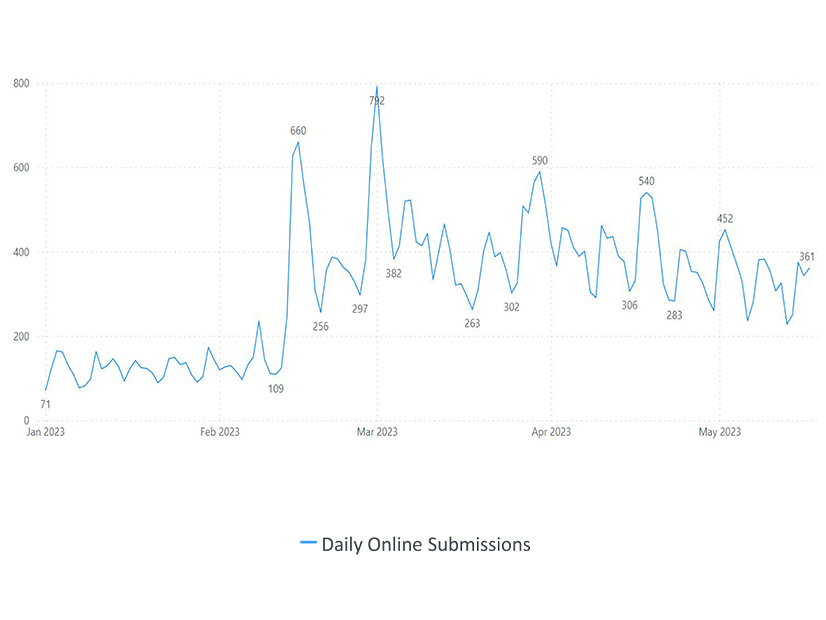
A recent price drop for Tesla’s Model 3 and Model Y electric vehicles have made the cars eligible again for a California EV rebate, and now the incentive program is quickly running out of money.
The potential funding depletion leaves in limbo California’s popular Clean Vehicle Rebate Project (CVRP), which has issued more than 500,000 rebates totaling more than $1.1 billion since its launch in 2010.
CVRP funding that was intended to last through June 2024 is now projected to run out as soon as November.
“At this point in time, there is no [additional] allocation for CVRP and as such, we plan to close the program once funding is out and not hold the waitlist,” Raquel Cardenas with the California Air Resources Board (CARB) said during a CVRP workshop last month. Cardenas is manager of CARB’s innovative light-duty strategies section.
The status of CVRP was also discussed Thursday during a CARB workshop on the agency’s overall funding strategy for clean vehicle incentives.
CARB is expecting to receive $441 million for all of its clean vehicle incentives in the next fiscal year — a steep drop from the $2.6 billion for incentive programs that the CARB board approved last year. The programs apply to vehicles ranging from e-bikes and cars to heavy-duty trucks, as well as clean mobility options such as bike or car sharing. (See CARB Approves $2.6B in Clean Vehicle Incentives.)
Last year’s $2.6 billion in incentive funding, which CARB called historic, was part of the state’s five-year, $10 billion multi-agency package to promote zero-emission vehicle adoption. California will ban the sale of gas-powered cars in 2035.
California is now facing a ballooning budget shortfall, and Gov. Gavin Newsom’s proposed budget trims the $10 billion ZEV package to $8.9 billion. (See Proposed Calif. Budget Retains Climate, Energy Funding.)
The $2.6 billion in funding followed a $1.5 billion allocation the previous year. The proposed $441 million for clean vehicle incentives in the next fiscal year is more in line with annual funding levels in 2016 through 2020, which ranged from $391 million to $588 million.
Rebate’s MSRP Cap
Tesla cars lost eligibility for CVRP incentives in March 2022 when the Manufacturers Suggested Retail Price increased to more than the CVRP cap of $45,000. (See Tesla Ineligibility to Shake up Calif. Clean Vehicle Rebate Program.)
But Tesla’s Model 3 and Model Y regained eligibility as of Feb. 13 after the automaker lowered the MSRP. Since then, Tesla vehicles have accounted for about 80% of all CVRP rebates.
Other factors are contributing to the rapid depletion of incentive funds. CVRP rebate amounts increased in February for low-income buyers, who can now receive $7,500 for a battery-electric vehicle, up from $4,500. The rebate for a low-income buyer of a plug-in hybrid increased to $6,500 from $3,500.
And starting this summer, low-income CVRP participants will also be able to receive a $2,000 prepaid card for use at public charging stations.
Last year’s $2.6 billion for clean vehicle incentives didn’t include money for the CVRP. That’s because in FY20/21, CARB allocated $515 million to the program, an amount intended to last through June 2024.
As of May 22, $281 million in CVRP funding remained. To keep the program running through next June, another $256 million to $837 million would be needed, according to the Center for Sustainable Energy, which administers CVRP on behalf of CARB.
Other Incentive Programs
CARB’s workshop last week was the first in a series of meetings on the FY23/24 funding plan for clean vehicle incentive programs.
The agency expects to release a draft of the plan in August ahead of a second workshop on Aug. 31. In addition, a series of community and work group meetings are planned through October.
The CARB board is expected to vote on the plan in November.
During Thursday’s workshop, CARB staff gave brief updates on other clean vehicle incentive programs.
An electric bicycle incentive program is set for a “soft launch” this month followed by a statewide launch later this year. The program will provide incentives of up to $2,000 to low-income buyers of e-bikes. A total of $13 million has been allocated to the program.
The Clean Cars for All (CC4A) program provides rebates to low-income residents who are scrapping an old car and buying an EV. The program has been administered through four regional air districts, and the San Diego Air Pollution Control District intends to launch its program this year.
CARB is in the process of expanding CC4A statewide. The agency expects to announce an administrator for the statewide program this summer.
